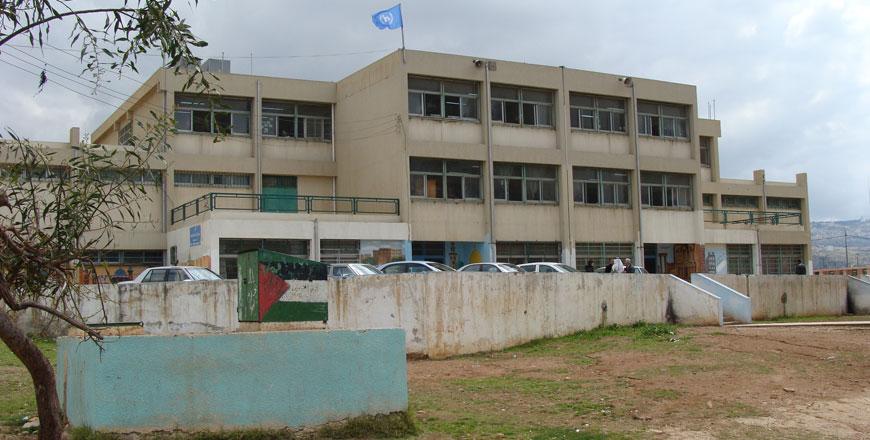You are here
UNRWA says Palestinian refugees facing ‘most profound crisis’ since exodus
By Laila Azzeh - Jun 15,2015 - Last updated at Jun 15,2015

An UNRWA school in Amman. The agency provides education to half-a-million young Palestinian refugees in its five areas of operation (File photo)
AMMAN — UNRWA's financial woes and the complexity of its mission amid the regional unrest were featured high on the agenda of the agency's advisory commission meeting on Monday.
With the relief organisation saying that it is facing the "most alarming" budget gap throughout its history, host countries expressed their "deep" concerns over the fate of the refugees, many of whom are about to become part of an "imperilled" community in conflict zones.
"UNRWA refugees are facing the most profound crisis since the original crisis in 1948," the agency's commissioner general, Pierre Krahenbuhl, said.
Jordan bluntly voiced its concern over the financial situation of the agency and the growing gap between its needs and income, especially with around 42 per cent of the total number of Palestinian refugees residing in the Kingdom.
"The government is committed to continued cooperation with
UNRWA and providing it with all means of support," said Minister of State for Media Affairs and Communications Mohammad Momani.
He underlined that the Palestinian issue remains the root of all tensions and threats in the Middle East and the entire world.
At the meeting, directors of the agency’s five fields of operations — Jordan, Syria, Lebanon, Gaza and the West Bank — underlined the situation in their respective regions, calling for an immediate mobilisation of resources to help UNRWA overcome its financial crisis.
Citing the political "failure" in addressing the plight of refugees, Krahenbuhl stressed that the "growing denial of dignity and rights for the refugees represents a time bomb in the region where the unrest is prevailing".
On the other hand, he denied as baseless allegations that the agency is reducing its services as the first step to shelf the entire file of Palestinian refugees.
"UNRWA's mandate is not for sale… UNRWA will never give up any inch of its mandate," he highlighted at a press conference that was held on the sidelines of UNRWA’s advisory commission meeting.
“With our budget deficit; we have three options to consider: approaching our existing donors, approaching new donors and taking internal measures to cut costs,” UNRWA’s chief told reporters.
“Sometimes cutting costs is mistakenly conveyed as cuts in services. This is incorrect. We are cutting costs to keep services,” he said.
‘UNRWA staff protesting’
The agency’s planned austerity measures have prompted around 30,000 of its employees, including 7,000 in Jordan, to observe a one-hour work stoppage on Monday, according to an informed source.
“The move is part of a series of measures they are planning to take. UNRWA understands their concerns,” Sami Mshasha, the agency’s spokesperson, told The Jordan Times on Monday.
Commenting on the issue, Krahenbuhl underlined that the protest is a “necessary” or “natural” reaction for any staff member scared by the austerity measures.
“There will be cutting costs around services. We know that this is very challenging, but we can do it,” he said.
He added that the agency’s educational services are considered, according to refugees, the most important and life-changing service that “saves their dignity and identity”.
“We do not look at Palestinian refugees as only people who receive aid. We invest in them through education with all our capacity,” the UN official said.
There are 700 UNRWA-run schools, in the agency’s five fields of operations, run by 22,000 employees who provide education to half-a-million students.
Regarding the situation of refugees in Syria, Krahenbuhl noted that more than half of the 560,000 refugees there are now displaced, while UNRWA has not been able to access thousands of Yarmouk refugee camp residents since March 28.
The situation is not any better in Gaza, where 1.2 million refugees, of whom 65 per cent are youth, are facing poverty, displacement, unemployment and the consequences of three conflicts in less than five years.
Asked whether the agency will play a political role in the upcoming stage, he underlined that UNRWA has “not been mandated for a political role, but our duty is to highlight the human cost of the lack of a political resolution”.
He described the agency’s relationship with Israel today as “direct” and “full of tough discussions”, adding that there are major differences in the way the two sides perceive UNRWA’s role in advocating the rights of Palestinian refugees.
Today, nearly one-third of the 5 million registered Palestine refugees, about 1.5 million individuals, live in 58 recognised refugee camps in the region.
Related Articles
Bringing momentum and sustainability to efforts aimed at supporting displaced Palestinian communities was the highlight of the UNRWA advisory commission meetings that opened on Monday at the Dead Sea.
DEAD SEA — UNRWA continues to offer a safe haven for Palestinian refugees, despite operating at a time of regional turmoil that complicates
AMMAN – UNRWA schools will open on time after nearly three months of anticipation over the fate of its educational programme.
















